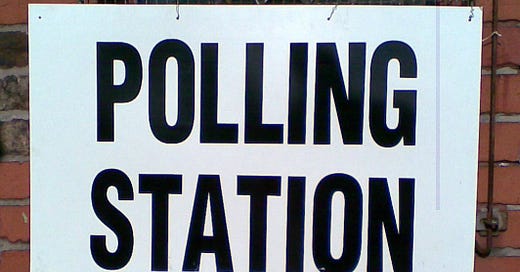Legislative Task Force Will Study Voting Rights for Louisiana's 643,000 Disabled Voters
The resolution initially faced heavy GOP opposition, but passed unanimously with the removal of curbside voting.

Last week, the Louisiana Legislature commissioned a task force that will study the unique challenges faced by disabled voters across the state.
"Disabled people already encounter so many impediments during their everyday lives, but there should be no barriers when it comes to their constitutionally protected right to cast their votes,” said New Orleans Rep. Matthew Willard (D). “The task force created by HCR 14 will inform members of the Legislature of the problems our disabled voters have encountered when exercising their right to vote. By granting them a seat at the table, the task force will enable our disabled citizens to provide recommendations directly to policymakers on ways we can streamline and improve accessibility for our disabled voters."
The resolution initially faced heavy pushback from Louisiana House Republicans, who seemed convinced that current accommodations are good enough.
“What we already do now, to me, seems to be most efficient,” Said Rep. Dodie Horton (R-Haughton). “And if someone goes to a polling place that’s not, all they to do is call their clerk of court, and I assure you that accommodations will be made.”
However, Secretary of State Kyle Ardoin noted that forcing disabled people to ask for personal assistance fails to give them the anonymity that is their constitutionally guaranteed right.
“They would like as many options as possible to be able to vote independently and not have to have assistance at the polling places,” Ardoin said. “To my understanding, I think that’s why they’re asking us to do this study.”
Another Republican concern was that the task force could possibly recommend accommodations such as curbside voting and ballot drop-boxes, which they feel go beyond the Americans with Disabilities Act’s required “reasonable accommodations.”
“When you use the term disability, now all of a sudden we’re going to have somebody who’s, I don’t know, got some mild depression that’s fallen into this category,” Rep. Beau Beaullieu (R-New Iberia) said. “Can it open up to other things is more what I worry about when you start going down this task force deal.”
According to Rutgers Univerity’s Program on Disability Research, 643,000 disabled Louisianans are eligible to vote, but only 270,000 voted in the 2020 election. Louisiana also has the highest percentage of visually disabled residents (23%) in the country. That excludes people in nursing homes and jails.
“I just think as a general policy matter we should never be opposed to the idea of studying something to be more informed about any subject matter even if we’re afraid of what the study might reveal — period,” Rep. Royce Duplessis (D-New Orleans) said.
“We may say we care about people who have disabilities, etcetera, but the reality is that many times we don’t understand or know the full extent of what a disability truly even is,” Duplessis said. “So sometimes we are all at fault for assuming that a disability is just someone who is limited to a wheelchair or a disability is someone who is just blind.”
Eventually, a clause specifically identifying curbside voting as a possible solution to be studied was removed from the resolution, which eventually passed both the House and Senate.
Support Local, Independent Journalism
ReportNOLA is the sole creation of Jennsen Bentley - a local, independent journalist who is dedicated to serving the community of New Orleans. As a proud member of the Society of Professional Journalists, he is dedicated to ethical reporting on issues that matter.



